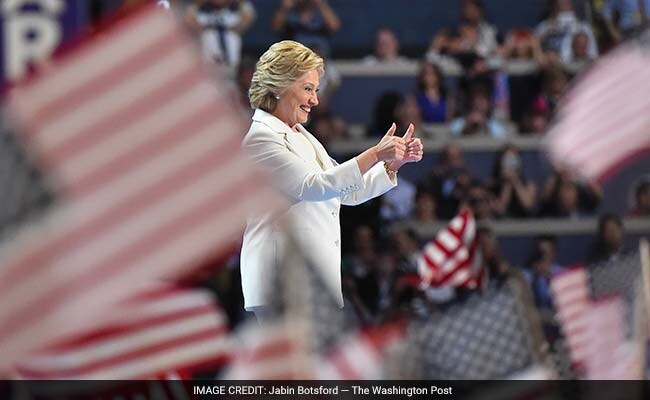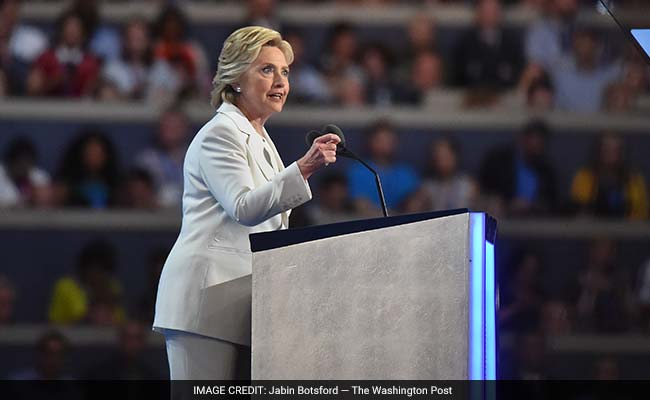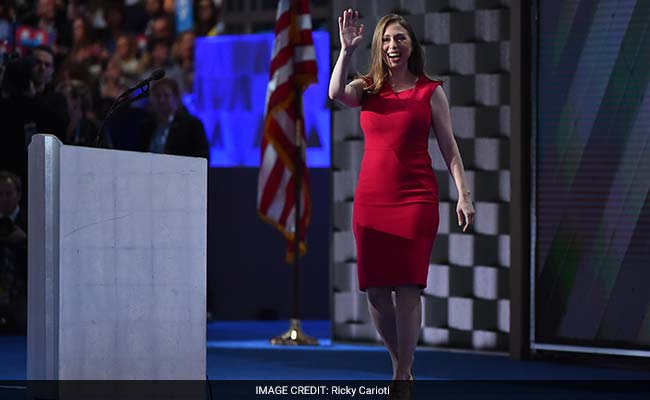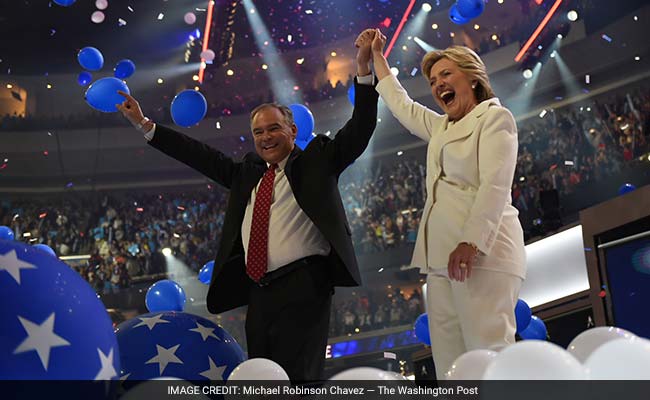
Democratic presidential nominee Hillary Clinton addressed Democratic National Convention in Philadelphia.
Philadelphia:
Hillary Clinton sought to transcend doubts about her character by presenting an uplifting vision for the nation's future, delivering the biggest speech of her enduring public life here Thursday as she formally accepted the Democratic presidential nomination.
Declaring that the United States is at "a moment of reckoning," Clinton promised that "progress is possible" and offered herself as a fearless executive who would get the job done. She also warned against what she considers the dangers represented by Republican nominee Donald Trump, who she said would usher in "midnight in America."
In an address that electrified delegates and put a personal exclamation point on the four-day Democratic National Convention, Clinton yoked the history of Philadelphia, the cradle of American democracy, with her own historic candidacy to become the country's first female president.
"Powerful forces are threatening to pull us apart," she said. "Bonds of trust and respect are fraying. And just as with our founders, there are no guarantees. It truly is up to us. We have to decide whether we all will work together so we all can rise together."
Clinton's 57-minute address was a coda to a convention week in which Democrats offered a meticulously choreographed answer to Trumpism and its apocalyptic view of the nation. They espoused service and diversity, inclusion and acceptance, and spoke of how the nation is "stronger together" - the newly energized anthem of the Clinton campaign.
 The candidate delivered a scathing, although at times humorous, dressing-down of Trump and his polarizing brand of politics, declaring that as president she would neither ban a religion nor build a wall to keep immigrants out of the country.
The candidate delivered a scathing, although at times humorous, dressing-down of Trump and his polarizing brand of politics, declaring that as president she would neither ban a religion nor build a wall to keep immigrants out of the country.
"He's taken the Republican Party a long way, from 'Morning in America' to 'Midnight in America,' " Clinton said, the former a reference to Ronald Reagan's 1984 campaign theme. "He wants us to fear the future and fear each other. . . . We are clear-eyed about what our country is up against. But we are not afraid. We will rise to the challenge, just as we always have."
Throughout the speech there were spasms of protest and boos - some people unfurled banners reading "#WIKILEAKS" and "KEEP YOUR PROMISES" - which were mostly drowned out by shouts of "Hill-a-ry." The scene served as a reminder that Clinton is continually trailed by those who find her objectionable, even when accepting her party's nomination.
Clinton narrated the crusades of her nearly five decades in public service from an idealistic young activist lawyer to a globe-trotting diplomat. She cited not only her years in government, but also her personal experiences as a woman, as qualifications to be president.
She made no explicit reference to the controversies that have dogged her campaign, chief among them her use of a private email server as secretary of state, but cast herself as resilient in the face of challenges: "More than a few times, I've had to pick myself up and get back in the game."
The former secretary of state offered what she hopes will be an unimpeachable rationale to restive voters for keeping the White House in Democratic hands by distilling what she would do on issues foreign and domestic, how she would build on President Barack Obama's legacy and why she thinks Trump is temperamentally unfit to hold the office.
"He loses his cool at the slightest provocation," Clinton said. "When he's gotten a tough question from a reporter. When he's challenged in a debate. When he sees a protester at a rally. Imagine him in the Oval Office facing a real crisis. A man you can bait with a tweet is not a man we can trust with nuclear weapons."
Addressing the urgent threat of Islamic State terrorists, Clinton said, "Anyone reading the news can see the threats and turbulence we face. . . . So it's no wonder people are anxious and looking for reassurance - looking for steady leadership."
Of her opponent, she added: "Now Donald Trump says, and this is a quote, 'I know more about ISIS than the generals do.' No, Donald, you don't."
At times, her speech felt like a president's State of the Union address, ticking through a litany of policy promises that were bound to please nearly every Democratic constituency and interest group - including jobs, gun control, infrastructure and health care.
An underlying theme of Clinton's address was that progress can be achieved only if people work together - a direct rebuke to Trump's pledge that he alone can fix what ails the nation.
"Every generation of Americans has come together to make our country freer, fairer and stronger," she said. "None of us can do it alone. I know that at a time when so much seems to be pulling us apart, it can be hard to imagine how we'll ever pull together again. But I'm here to tell you tonight: Progress is possible."
Over the convention's first three days, a parade of Clinton advocates - the president and vice president, her former primary rivals, virtually every prominent Democratic leader and a diverse array of everyday Americans - extolled her virtues and eviscerated her opponent.
But it ultimately fell to Clinton to make her own case. It was a major test for a candidate who has struggled all year to galvanize liberals, not to mention persuade independent voters.
The address closed an unexpectedly difficult chapter for Clinton. Long considered Obama's heir apparent, she endured a persistent primary challenge from Sen. Bernie Sanders (Vermont), a self-described democratic socialist who rose from relative obscurity to rally grass-roots liberals.
Sanders's improbable success provided daily reminders of Clinton's difficulties as a political performer and her vulnerabilities as a creature of the old order at a time when voters crave change.
Capping a week orchestrated to foster party unity, Clinton made a direct appeal to Sanders's most fervent supporters who have resisted her candidacy.
"I want you to know, I've heard you," she said. "Your cause is our cause. Our country needs your ideas, energy and passion."
After Obama, Vice President Joe Biden and first lady Michelle Obama delivered acclaimed speeches, the bar was high for Clinton. By midafternoon Thursday, the final draft of her speech, which she had worked on for several weeks, still was not complete.
Clinton spent the day huddled with her advisers fine-tuning the text, following her husband Bill Clinton's practice of last-minute cramming. The former president famously obsesses over lines in his speeches until the moment he walks on stage, and still regularly strays from the prepared text on teleprompters. "It's never over till it's over," campaign manager Robby Mook said playfully.
In her remarks, Hillary Clinton invoked her 1996 book, "It Takes a Village," which aides said she considers a forerunner to her campaign theme of "Stronger Together."
Clinton's daughter, Chelsea Clinton, introduced her by saying her mother "never, ever forgets who she's fighting for."
 Just as Ivanka Trump did for her father at last week's Republican National Convention in Cleveland, Chelsea Clinton delivered a deeply personal character testimonial that offered an intimate look at the candidate's role as a mother and grandmother.
Just as Ivanka Trump did for her father at last week's Republican National Convention in Cleveland, Chelsea Clinton delivered a deeply personal character testimonial that offered an intimate look at the candidate's role as a mother and grandmother.
With former president Bill Clinton looking on from the convention floor with watery eyes and a proud smile, Chelsea Clinton shared stories of growing up in Arkansas. She said that whenever her mother went on work trips, she would leave notes for Chelsea to open, a different one each day.
"She was always, always there for me - every soccer game, every softball game, every piano recital, every dance recital," Chelsea said. "Sundays spent together at church and the local library, countless Saturdays spent finding shapes in the clouds, making up stories about what we would do if we ever saw a triceratops."
Also introducing the nominee was a Hollywood-style biographical video called "Hillary." The 12-minute film - narrated by actor Morgan Freeman and produced by television writers Shonda Rhimes and Betsy Beers - featured interviews with Obama, Bill Clinton, a survivor and first responder from the Sept. 11, 2001, terrorist attacks, as well as one of Hillary Clinton's childhood friends.
The film was a cinematic capstone of a week-long effort in Philadelphia to present in a new light a candidate who is universally known and widely disliked.
The procession of speakers who preceded Clinton, coupled with a series of short videos and performances by entertainers including Katy Perry and Carole King, collectively presented a case for putting Clinton in the White House.
As during the convention's first three nights, the speakers embodied the diversity of the country. The father of fallen Army Capt. Humayun Khan, 27, of suburban Washington, who died in an explosion in Iraq in 2004, repudiated Trump for sowing division.
"Donald Trump consistently smears the character of Muslims," said Khizr Khan, with his wife at his side. He added, "Donald Trump, you're asking Americans to trust you with their future. Let me ask you: Have you even read the United States Constitution?"
Taking a copy of the Constitution out of his pocket and holding it in the air, he said, "I will gladly lend you my copy."
Khan was followed by retired Gen. John Allen, a former U.S. special envoy in the fight against the Islamic State, who delivered a full-throated endorsement of Clinton. He was flanked by dozens of other veterans - a powerful, prime-time display that appropriated the military imagery of Republican conventions past.
After the Republican convention cast Trump as a law-and-order candidate, the Democrats on Thursday night paid tribute to law enforcement officers while stressing the need for safer and more effective policing. An emotional highlight came when family members of slain police officers spoke movingly about their fallen heroes.
The evening's program was imbued with a recognition of Clinton's historic feat: becoming the first female presidential nominee of a major party. All 12 Democratic female senators strode on stage together, each delivering brief descriptions of their former colleague - and, for the younger senators, role model - as a loyal, humble, hard-working and steady force on Capitol Hill.
 As Clinton looked out on a rapturous crowd, she took in the gravity of the moment.
As Clinton looked out on a rapturous crowd, she took in the gravity of the moment.
"Standing here as my mother's daughter, and my daughter's mother," she said, "I'm so happy this day has come."
After Clinton finished her speech, she was joined on stage by running mate Tim Kaine, and later, their extended families. Next came a display of pyrotechnics, and then a cascade of balloons. Clinton, euphoric, picked up a giant blue and white starred balloon and playfully batted it into the air.
© 2016 The Washington Post
(This story has not been edited by NDTV staff and is auto-generated from a syndicated feed.)
Declaring that the United States is at "a moment of reckoning," Clinton promised that "progress is possible" and offered herself as a fearless executive who would get the job done. She also warned against what she considers the dangers represented by Republican nominee Donald Trump, who she said would usher in "midnight in America."
In an address that electrified delegates and put a personal exclamation point on the four-day Democratic National Convention, Clinton yoked the history of Philadelphia, the cradle of American democracy, with her own historic candidacy to become the country's first female president.
"Powerful forces are threatening to pull us apart," she said. "Bonds of trust and respect are fraying. And just as with our founders, there are no guarantees. It truly is up to us. We have to decide whether we all will work together so we all can rise together."
Clinton's 57-minute address was a coda to a convention week in which Democrats offered a meticulously choreographed answer to Trumpism and its apocalyptic view of the nation. They espoused service and diversity, inclusion and acceptance, and spoke of how the nation is "stronger together" - the newly energized anthem of the Clinton campaign.

Hillary Clinton at the Democratic National Convention in Philadelphia on Thursday.
"He's taken the Republican Party a long way, from 'Morning in America' to 'Midnight in America,' " Clinton said, the former a reference to Ronald Reagan's 1984 campaign theme. "He wants us to fear the future and fear each other. . . . We are clear-eyed about what our country is up against. But we are not afraid. We will rise to the challenge, just as we always have."
Throughout the speech there were spasms of protest and boos - some people unfurled banners reading "#WIKILEAKS" and "KEEP YOUR PROMISES" - which were mostly drowned out by shouts of "Hill-a-ry." The scene served as a reminder that Clinton is continually trailed by those who find her objectionable, even when accepting her party's nomination.
Clinton narrated the crusades of her nearly five decades in public service from an idealistic young activist lawyer to a globe-trotting diplomat. She cited not only her years in government, but also her personal experiences as a woman, as qualifications to be president.
She made no explicit reference to the controversies that have dogged her campaign, chief among them her use of a private email server as secretary of state, but cast herself as resilient in the face of challenges: "More than a few times, I've had to pick myself up and get back in the game."
The former secretary of state offered what she hopes will be an unimpeachable rationale to restive voters for keeping the White House in Democratic hands by distilling what she would do on issues foreign and domestic, how she would build on President Barack Obama's legacy and why she thinks Trump is temperamentally unfit to hold the office.
"He loses his cool at the slightest provocation," Clinton said. "When he's gotten a tough question from a reporter. When he's challenged in a debate. When he sees a protester at a rally. Imagine him in the Oval Office facing a real crisis. A man you can bait with a tweet is not a man we can trust with nuclear weapons."
Addressing the urgent threat of Islamic State terrorists, Clinton said, "Anyone reading the news can see the threats and turbulence we face. . . . So it's no wonder people are anxious and looking for reassurance - looking for steady leadership."
Of her opponent, she added: "Now Donald Trump says, and this is a quote, 'I know more about ISIS than the generals do.' No, Donald, you don't."
At times, her speech felt like a president's State of the Union address, ticking through a litany of policy promises that were bound to please nearly every Democratic constituency and interest group - including jobs, gun control, infrastructure and health care.
An underlying theme of Clinton's address was that progress can be achieved only if people work together - a direct rebuke to Trump's pledge that he alone can fix what ails the nation.
"Every generation of Americans has come together to make our country freer, fairer and stronger," she said. "None of us can do it alone. I know that at a time when so much seems to be pulling us apart, it can be hard to imagine how we'll ever pull together again. But I'm here to tell you tonight: Progress is possible."
Over the convention's first three days, a parade of Clinton advocates - the president and vice president, her former primary rivals, virtually every prominent Democratic leader and a diverse array of everyday Americans - extolled her virtues and eviscerated her opponent.
But it ultimately fell to Clinton to make her own case. It was a major test for a candidate who has struggled all year to galvanize liberals, not to mention persuade independent voters.
The address closed an unexpectedly difficult chapter for Clinton. Long considered Obama's heir apparent, she endured a persistent primary challenge from Sen. Bernie Sanders (Vermont), a self-described democratic socialist who rose from relative obscurity to rally grass-roots liberals.
Sanders's improbable success provided daily reminders of Clinton's difficulties as a political performer and her vulnerabilities as a creature of the old order at a time when voters crave change.
Capping a week orchestrated to foster party unity, Clinton made a direct appeal to Sanders's most fervent supporters who have resisted her candidacy.
"I want you to know, I've heard you," she said. "Your cause is our cause. Our country needs your ideas, energy and passion."
After Obama, Vice President Joe Biden and first lady Michelle Obama delivered acclaimed speeches, the bar was high for Clinton. By midafternoon Thursday, the final draft of her speech, which she had worked on for several weeks, still was not complete.
Clinton spent the day huddled with her advisers fine-tuning the text, following her husband Bill Clinton's practice of last-minute cramming. The former president famously obsesses over lines in his speeches until the moment he walks on stage, and still regularly strays from the prepared text on teleprompters. "It's never over till it's over," campaign manager Robby Mook said playfully.
In her remarks, Hillary Clinton invoked her 1996 book, "It Takes a Village," which aides said she considers a forerunner to her campaign theme of "Stronger Together."
Clinton's daughter, Chelsea Clinton, introduced her by saying her mother "never, ever forgets who she's fighting for."

Chelsea Clinton, daughter of Democratic presidential nominee Hillary Clinton.
With former president Bill Clinton looking on from the convention floor with watery eyes and a proud smile, Chelsea Clinton shared stories of growing up in Arkansas. She said that whenever her mother went on work trips, she would leave notes for Chelsea to open, a different one each day.
"She was always, always there for me - every soccer game, every softball game, every piano recital, every dance recital," Chelsea said. "Sundays spent together at church and the local library, countless Saturdays spent finding shapes in the clouds, making up stories about what we would do if we ever saw a triceratops."
Also introducing the nominee was a Hollywood-style biographical video called "Hillary." The 12-minute film - narrated by actor Morgan Freeman and produced by television writers Shonda Rhimes and Betsy Beers - featured interviews with Obama, Bill Clinton, a survivor and first responder from the Sept. 11, 2001, terrorist attacks, as well as one of Hillary Clinton's childhood friends.
The film was a cinematic capstone of a week-long effort in Philadelphia to present in a new light a candidate who is universally known and widely disliked.
The procession of speakers who preceded Clinton, coupled with a series of short videos and performances by entertainers including Katy Perry and Carole King, collectively presented a case for putting Clinton in the White House.
As during the convention's first three nights, the speakers embodied the diversity of the country. The father of fallen Army Capt. Humayun Khan, 27, of suburban Washington, who died in an explosion in Iraq in 2004, repudiated Trump for sowing division.
"Donald Trump consistently smears the character of Muslims," said Khizr Khan, with his wife at his side. He added, "Donald Trump, you're asking Americans to trust you with their future. Let me ask you: Have you even read the United States Constitution?"
Taking a copy of the Constitution out of his pocket and holding it in the air, he said, "I will gladly lend you my copy."
Khan was followed by retired Gen. John Allen, a former U.S. special envoy in the fight against the Islamic State, who delivered a full-throated endorsement of Clinton. He was flanked by dozens of other veterans - a powerful, prime-time display that appropriated the military imagery of Republican conventions past.
After the Republican convention cast Trump as a law-and-order candidate, the Democrats on Thursday night paid tribute to law enforcement officers while stressing the need for safer and more effective policing. An emotional highlight came when family members of slain police officers spoke movingly about their fallen heroes.
The evening's program was imbued with a recognition of Clinton's historic feat: becoming the first female presidential nominee of a major party. All 12 Democratic female senators strode on stage together, each delivering brief descriptions of their former colleague - and, for the younger senators, role model - as a loyal, humble, hard-working and steady force on Capitol Hill.

Democratic presidential nominee Hillary Clinton celebrates with running mate Tim Kaine.
"Standing here as my mother's daughter, and my daughter's mother," she said, "I'm so happy this day has come."
After Clinton finished her speech, she was joined on stage by running mate Tim Kaine, and later, their extended families. Next came a display of pyrotechnics, and then a cascade of balloons. Clinton, euphoric, picked up a giant blue and white starred balloon and playfully batted it into the air.
© 2016 The Washington Post
(This story has not been edited by NDTV staff and is auto-generated from a syndicated feed.)
Track Latest News Live on NDTV.com and get news updates from India and around the world

